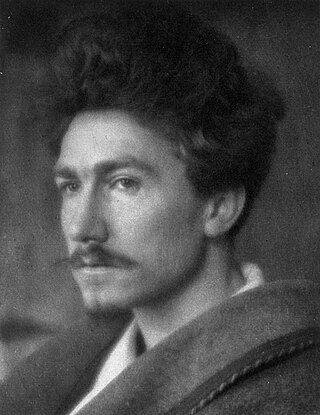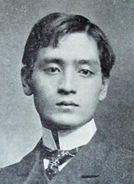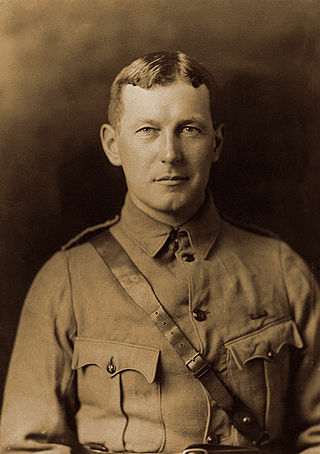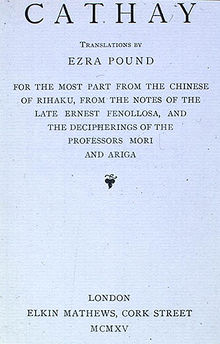
Li Bai, also pronounced as Li Bo, courtesy name Taibai, was a Chinese poet, acclaimed from his own time to the present as one of the greatest and most important poets of the Tang dynasty and in Chinese history as a whole. He and his friend Du Fu (712–770) were two of the most prominent figures in the flourishing of Chinese poetry under the Tang dynasty, which is often called the "Golden Age of Chinese Poetry". The expression "Three Wonders" denotes Li Bai's poetry, Pei Min's swordplay, and Zhang Xu's calligraphy.

Ezra Weston Loomis Pound was an expatriate American poet and critic, a major figure in the early modernist poetry movement, and a collaborator in Fascist Italy and the Salò Republic during World War II. His works include Ripostes (1912), Hugh Selwyn Mauberley (1920), and his 800-page epic poem, The Cantos.

Imagism was a movement in early-20th-century Anglo-American poetry that favored precision of imagery and clear, sharp language. It is considered to be the first organized modernist literary movement in the English language. Imagism is sometimes viewed as "a succession of creative moments" rather than a continuous or sustained period of development. The French academic René Taupin remarked that "it is more accurate to consider Imagism not as a doctrine, nor even as a poetic school, but as the association of a few poets who were for a certain time in agreement on a small number of important principles".

Robert Laurence Binyon, CH was an English poet, dramatist and art scholar. Born in Lancaster, England, his parents were Frederick Binyon, a clergyman, and Mary Dockray. He studied at St Paul's School, London and at Trinity College, Oxford, where he won the Newdigate Prize for poetry in 1891. He worked for the British Museum from 1893 until his retirement in 1933. In 1904 he married the historian Cicely Margaret Powell, with whom he had three daughters, including the artist Nicolete Gray.
Modernist poetry in English started in the early years of the 20th century with the appearance of the Imagists. In common with many other modernists, these poets wrote in reaction to the perceived excesses of Victorian poetry, with its emphasis on traditional formalism and ornate diction. In many respects, their criticism echoes what William Wordsworth wrote in Preface to Lyrical Ballads to instigate the Romantic movement in British poetry over a century earlier, criticising the gauche and pompous school which then pervaded, and seeking to bring poetry to the layman.

Ernest Francisco Fenollosa was an American art historian of Japanese art, professor of philosophy and political economy at Tokyo Imperial University. An important educator during the modernization of Japan during the Meiji Era, Fenollosa was an enthusiastic Orientalist who did much to preserve traditional Japanese art.

The Cantos by Ezra Pound is a long, incomplete poem in 120 sections, each of which is a canto. Most of it was written between 1915 and 1962, although much of the early work was abandoned and the early cantos, as finally published, date from 1922 onwards. It is a book-length work, widely considered to present formidable difficulties to the reader. Strong claims have been made for it as the most significant work of modernist poetry of the twentieth century. As in Pound's prose writing, the themes of economics, governance and culture are integral to its content.

Dorothy Shakespear was an English artist. She was the daughter of novelist Olivia Shakespear and the wife of American poet Ezra Pound. One of a small number of women vorticist painters, her art work was published in BLAST, the short-lived but influential literary magazine.

Yonejirō Noguchi was an influential Japanese writer of poetry, fiction, essays and literary criticism in both English and Japanese. He is known in the west as Yone Noguchi. He was the father of noted sculptor Isamu Noguchi.
Nationality words link to articles with information on the nation's poetry or literature, including Irish or France.
Ira Bruce Nadel is an American-Canadian biographer, literary critic and James Joyce scholar, and a distinguished professor at the University of British Columbia. He has written books on the twentieth-century Modernists, especially Ezra Pound and Joyce, biographies of Leonard Cohen and Leon Uris, and on Jewish-American authors. He has won Canadian literary awards, and has edited and written the introduction to a number of scholarly books and period pieces. He is a critic of the Olympic torch relay as a legacy of the Nazis.
"The River Merchant's Wife: A Letter" is a four stanza poem, written in free verse, and loosely translated by Ezra Pound from a poem by Chinese poet Li Bai. It first appeared in Pound's 1915 collection Cathay. It is the most widely anthologized poem of the collection. In addition to "The Jewell Stairs' Grievance" and "The Exile's Letter", also included in the collection, Zhaoming Qian has referred to "The River Merchant's Wife" as an "imagist and vorticist [masterpiece]".

Nationality words link to articles with information on the nation's poetry or literature.

Tang poetry refers to poetry written in or around the time of or in the characteristic style of China's Tang dynasty, and/or follows a certain style, often considered as the Golden Age of Chinese poetry. The Complete Tang Poems includes over 48,900 poems written by over 2,200 authors. During the Tang dynasty, poetry continued to be an important part of social life at all levels of society. Scholars were required to master poetry for the civil service exams, but the art was theoretically available to everyone. This led to a large record of poetry and poets, a partial record of which survives today. The two most famous poets of the period were Li Bai and Du Fu. The Qing dynasty selection,Three Hundred Tang Poems, has made Tang poetry familiar to educated Chinese in modern times.
Le Testament de Villon is an opera composed in 1923 by the American poet Ezra Pound, with assistance from George Antheil. It is based on Le Testament, a collection of poems written by François Villon in 1461.

A Lume Spento is a 1908 poetry collection by Ezra Pound. Self-published in Venice, it was his first collection.
William Brooke Smith was an American painter and friend of Ezra Pound. His death from tuberculosis greatly affected Pound, who dedicated his first poetry collection, A Lume Spento, to Smith.

The Spirit of Romance is a 1910 book of literary criticism by the poet Ezra Pound. It is based on lectures he delivered at the Regent Street Polytechnic in London between 1908 and 1909 and deals with a variety of European literatures. As with Pound's later, unfinished poem The Cantos, the book follows "a pattern, at once historical and atemporal, of cultural beginnings and rebeginnings".
David Happell Hsin-fu Wand (1931–1977) was a poet, translator, collaborator with William Carlos Williams and Ezra Pound, and editor responsible for the popularization of Asian-American literature through his 1974 anthology Asian American Heritage: An Anthology of Prose and Poetry. After espousing virulently neo-fascistic and segregationist views in the 1950s under the tutelage of Pound, Wand moved to California in the 60s and became a supporter of the Black Power movement, seeing parallels between the Asian-American and African-American experience.











